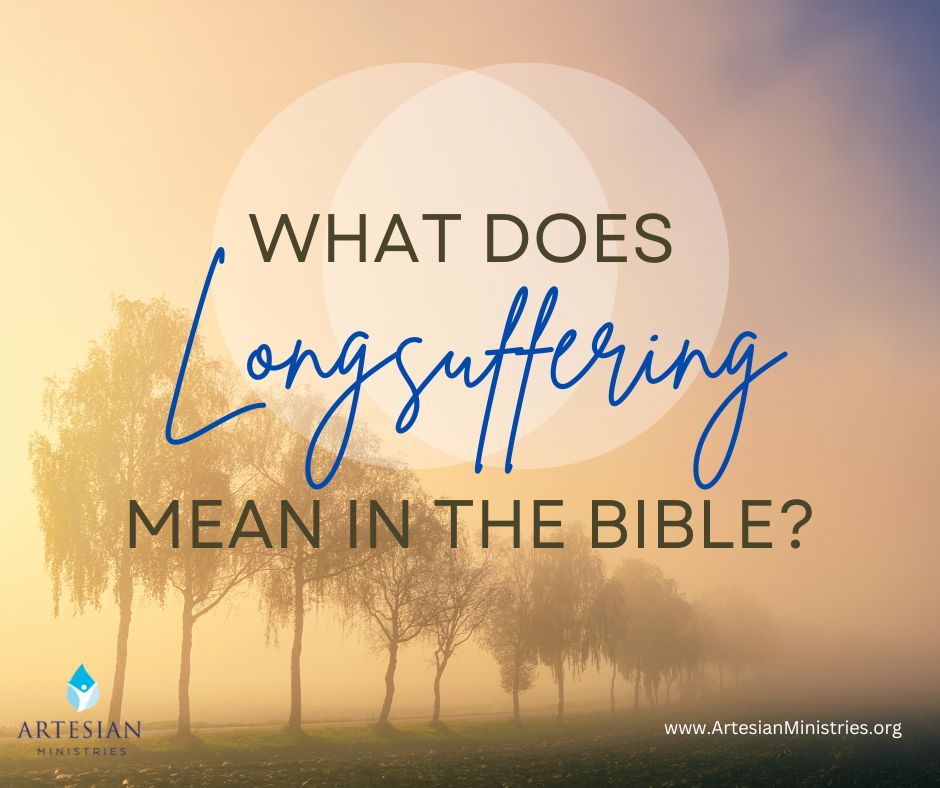Roy had a beautiful wife and three strapping sons. He was a successful businessman and respected church leader. One day he went in for routine back surgery and something went horribly wrong on the operating table.

For the next ten years, Roy lived in a vegetative state. That is a long time. He could not feed himself, get out of bed, or function whatsoever on his own. His wife, Arleah, turned their home’s living room into his hospital room. For ten years, hundreds upon hundreds of people — lots of people — took turns volunteering to help care for him and his family.
I never heard Arleah complain. Not once. Her steadfast love was a beautiful testimony. Each Christmas, my friends and I from church would go and sing Christmas carols to Roy and Arleah. Sometimes, Roy would try to sing along with us. Somewhere deep inside him, Jesus was alive in his memory. Now Roy is experiencing Jesus face-to-face.
The Weight of Suffering
If you are breathing, you have experienced suffering. It’s simply the not-so-simple part of life. Whether through sickness, life challenges, vocation struggles, or the death of loved ones, we have all suffered. We may view difficult situations as suffering, but it goes much deeper than surface discomfort.
When I think of a longsuffering person, my mind goes to Arleah. She endured ten years taking care of Roy who was the love of her life. I think of a parent who has lost a child and the void that it leaves. Or someone who has struggled with a serious addiction for their whole adult life.
But that’s not how Scripture defines longsuffering.

What is Longsuffering?
Longsuffering often means the patience to endure our suffering – not the suffering itself. Remember Job? His suffering was excruciating, unfair, and long, yet he never lost faith in God. His friends admonished him, and his wife told him to curse God, but Job remained steadfast.
Job endured his suffering with patient endurance. Job was longsuffering because he placed his hope and trust in God. Job told God every emotion he struggled with, yet steadfastly depended on the Lord for the strength to endure.

What Does the Bible Say About Suffering?
One of the key passages that tackle suffering is found in 1 Peter 5: “And after you have suffered a little while, the God of all grace, who has called you to His eternal glory in Christ, will Himself restore, confirm, strengthen, and establish you. To Him be the dominion forever and ever. Amen” (1 Peter 5:10-11, ESV).
What does a “little while” mean? From the context, it appears that the end of our suffering points to the time of eternal glory. So at face value, when God calls us into eternal glory (basically when we die), He will do for us all of those wonderful things listed: restore, confirm, strengthen, and establish.

Does a “Little While” Last a Lifetime?
Keeping in mind the 1 Peter 5 passages above, let’s compare 1 Peter 1:6-7: “In this you rejoice, though now for a little while, if necessary, you have been grieved by various trials, so that the tested genuineness of your faith — more precious than gold that perishes though it is tested by fire — may be found to result in praise and glory and honor at the revelation of Jesus Christ.”
The “little while” used here and in 1 Peter 5 is the same phrase. The context points to the fact that a “little while” will end at the “revelation of Jesus Christ.” In other words, at the end of our life here.
Let’s look at one more place: “All flesh is like grass and all its glory like the flower of the grass. The grass withers and the flower falls, but the word of the Lord remains forever” (1 Peter 1:24-25, ESV).
These verses offer a contrast between what is temporary (flesh, grass, and flowers) and what is eternal (the Word of the Lord). In other words, it contrasts between ordinary life and eternal life. Our time on earth and our eternity in heaven.

How Long Does Suffering Last?
With those three sets of passages in mind in their proper context, we can conclude that a “little while” lasts our lifetime. Not a week, a month, or even a year. It lasts until God calls us home, whether that is at age 20, 30, 50, 65, or 90.
If you are in a particular season of hard suffering, that conclusion does not sit well at all. We want to see the end of suffering, in our everyday life and in the lives of those we love. We long for the burdensome weight of suffering to be lifted off of our chests right now. We just need a little breather, right?
But let’s look at suffering from a slightly different perspective. You have probably heard someone say, “Just tell me the truth. Give me all the facts. I can handle anything as long as I know the truth.” Perhaps you have said it yourself.

What Are the Facts?
The fact is that in this world we will have trouble. We will suffer. Jesus warned us ahead of time. He told us the truth and laid out the facts. But that isn’t all that Jesus tells us: “I have told you these things, so that in Me you may have peace. In this world you will have trouble. But take heart! I have overcome the world” (John 16:33, ESV).
When we are in Christ, even though we suffer, He has promised His peace and ultimate victory in spite of our pain. Even though our suffering lasts a little while (our lifetime), the contrast is eternity without sin, pain, or suffering. What an extraordinary glimpse into the riches of His kindness!
Eternity is infinitely longer that the blip on the timeline that we spend on Earth. Even if we have to endure a lifetime of suffering, there is coming a glory that far outweighs such things. That glory will last infinitely longer than the “little while” we reside on planet Earth.

What Now?
Those are the facts. Now that we know them, what can we look forward to? What is promised in that eternal glory?
First, as we saw in 1 Peter 5:10-11, the promises are for those who are in Christ. This eternal glory isn’t something that believers have to manufacture or work towards. The promises are rooted in Christ — His work, His value, His perfection, His righteousness, His resurrection, and His victory over sin and death. “In Christ” is the foundation of our eternal glory.
He promises to restore, confirm and strengthen us and provide us with an unshakable future with Him. The Apostle Paul puts it like this, “He will transform our lowly body to be like His glorious body, by the power that enables Him even to subject all things to Himself” (Philippians 3:21, ESV).

How Can We Cultivate Patience?
How can we cultivate the patience to endure? To be longsuffering amidst our trials?
First and foremost, we are not expected to produce longsuffering, because God has already given it to every believer: “But the fruit of the Spirit is love, joy, peace, longsuffering, kindness, goodness, faithfulness, meekness, self-control; against such there is no law” (Galatians 5:22-23, ASV).
God has already given us longsuffering (patience)! The litmus test of faith is whether will we tap into it by faith or ignore it by choice. Because we can certainly choose to not love, not operate in the peace of God, not embrace longsuffering, not to display kindness, and so on.

Suffering Points to the Purpose of God
God does not allow suffering in our lives just for His amusement. The sin that broke this world broke God’s heart because it erected a barrier of sin in the face of His holiness. Our heavenly Father desires an intimate relationship with us so that one day we can wear the crown of life.
Yet nothing can separate us from His love (Romans 8:31-39). He spends our entire lives pursuing us with His love. His love chases us because He wants us to know Him — even in our suffering.
It is important to note that many blessings can come out of our suffering. God promises: “suffering produces endurance, and endurance produces character, and character produces hope” (Romans 5:3-4, ESV). Endurance, character, and hope — beautiful riches of His goodness.

Suffering Teaches Us to Love One Another
If we never saw pain and suffering in the world, how would we ever learn compassion? As believers, where would we get the patience to endure someone else’s illness if we never experienced an illness of our own? In our suffering, we learn to bear with one another in love. Paul teaches:
“I therefore, a prisoner for the Lord, urge you to walk in a manner worthy of the calling to which you have been called, with all humility and gentleness, with patience, bearing with one another in love” (Ephesians 4:1-2, ESV).

How Do We Develop Patience (Longsuffering)?
Webster’s 1828 dictionary defines patience as “the suffering of afflictions, pain, toil, calamity, provocation or other evil, with a calm, unruffled temper; endurance without murmuring or fretfulness.”
It adds that “patience may spring from constitutional fortitude, from a kind of heroic pride, or from Christian submission to the divine will.”
At its core, patience is submitting to Christ. Only He gives us the ability to persevere and face opposition (suffering) without complaining or taking revenge. I’ll be the first to raise my hand and admit that developing patience is hard. Flat out hard.
Yet with the Holy Spirit working in us, it is not an impossible dream. Here are three ways that Scripture shows us how to develop patience.

1. Practice thankfulness.
The more we notice, articulate, and thank God for everyday blessings, the less time we have to complain or be sorrowful. It takes mature faith to be thankful – even joyful – amidst life’s trials. But an attitude of gratitude increases our endurance.
Keep a gratitude journal. Journals are incredible because thoughts disentangle themselves over the lips and through the fingertips. Keeping a journal is powerful spiritual therapy.
“Dear brothers and sisters, when troubles of any kind come your way, consider it an opportunity for great joy. For you know that when your faith is tested, your endurance has a chance to grow” (James 1:2-3, NLT).

2. Listen to the Holy Spirit’s guidance.
Patience is a fruit of the Spirit, so it almost goes without saying that we need to listen and lean into the guidance of God’s Spirit. The Holy Spirit is the power of God in us. Jesus assures us that the Holy Spirit will guide us in all truth and remind us of His promises.
We understand His guidance when we spend time in Bible study. Times of suffering are tests of faith, so an in-depth study through the book of James would greatly help. (There’s a free one that you can download from my website.)
“When the Spirit of truth comes, he will guide you into all truth. He will not speak on his own but will tell you what he has heard. He will tell you about the future” (John 16:13, NLT).

3. Keep your eyes on Jesus.
Jesus is our ultimate role model when it comes to patience. He endured the worst so that by faith we would inherit His best. The sufferings of Christ offer the perfect picture of the patience of our Lord.
“Therefore we also, since we are surrounded by so great a cloud of witnesses, let us lay aside every weight, and the sin which so easily ensnares us, and let us run with endurance the race that is set before us, looking unto Jesus, the author and finisher of our faith, who for the joy that was set before Him endured the cross, despising the shame, and has sat down at the right hand of the throne of God” (Hebrews 12:1-2, ESV).
Laying aside “every weight” means laying our burdens at the foot of the cross. Some days that feels impossible. When we hurt or see our loved ones hurting, we want to do something. And we can.
We can get on our knees to pray to the One who gives us His peace that passes all understanding and offers us a fresh perspective through His eyes. Journaling your prayers is also an incredible blessing.

God’s Longsuffering
Have you ever stopped to thank God for how patient He is with us? We can be such knuckleheads. Self-centered, concerned only with our own lives, and armed with our own agendas, we often neglect to pause and remember His holy patience with us.
God’s patience is an incredible gift. Jesus was the epitome of divine longsuffering. He gave up His own life so that we might have the hope of everlasting life.
From Old Testament times throughout the New Testament and into today, God’s people have given in to our own sinful desires. Whether it is a love of money, an evil deed, the heart of man straying far from His, The longsuffering of our Lord creates a beautiful mosaic of the grace of God.

Bottom Line
You and I will suffer during our lifetimes here. But the hope beyond our “little while” is an eternal glory looking into the face of the One who restored us. Only Jesus has that power and dominion. In faith, we believe and trust His promises.
Those are the facts. There is an end to our suffering. Your “little while” may be longer than mine or vice versa. But there is an end to all suffering according to God’s plan for those who believe that Jesus suffered, died, was raised to life, and sits at the right hand of God.
When we grow weary and begin to doubt, worry, or despair, believe that Christ Jesus fights for us. We continue looking for the goodness of God, His tender mercies, and daily living a godly life.
Our Lord God has already won the battle against death. And it is this: “For our light and momentary troubles are achieving for us an eternal glory that far outweighs them all” (2 Corinthians 4:17, ESV).
So when God ushers us into eternity: “He will wipe away every tear from their eyes, and death shall be no more, neither shall there be mourning, nor crying, nor pain anymore, for the former things have passed away” (Revelation 21:4, ESV).
Amen.
Related Posts:
- Best Bible Reading Plans
- Warriors in the Bible: 13 Essential Life Lessons to Learn
- 50 Motivational Bible Verses About Aging Gracefully
About the Author
Although Donna is a sought-after Bible teacher, her path from being unchurched to become passionate about sharing Jesus was not easy. Go here to read her God-breathed journey, “From Unchurched to Becoming a Multi-Published Author and Sought-After Speaker.” If you want to send Donna a quick message, then visit her contact page here.
{Some of these links are affiliate links. This means if you make a purchase through that link, the ministry may receive a small commission at no extra cost to you. Thank you for your ministry support!}
